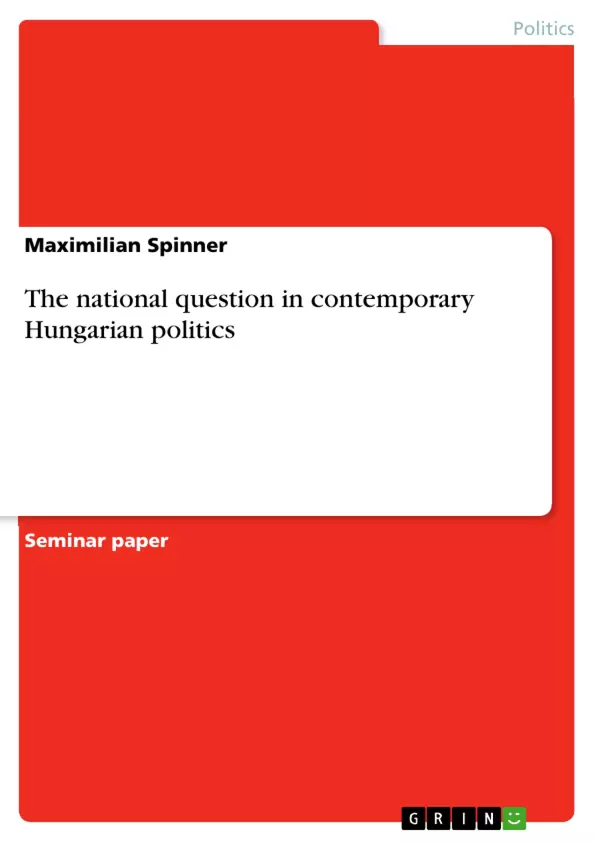This essay discusses how the question of national minorities outside Hungary shaped Hungarian politics in the post-transition period.
Inhaltsverzeichnis (Table of Contents)
- INTRODUCTION
- THE 'NATIONAL QUESTION' AND ACTORS IN HUNGARIAN POLITICS.
- COMMUNIST GOVERNMENTS FROM KÁDÁR TO NÉMETH
- THE FIRST DEMOCRATIC ELECTIONS AND THE DEMOCRATIC FORUM (MDF)
- THE SECOND POST-COMMUNIST GOVERNMENT (1994-98): THE SOCIALISTS (MSZP) AND THE FREE DEMOCRATS (SZDSZ)
- THE FIDESZ-GOVERNMENT
- RIGHT-WING OPPOSITION: THE JUSTICE AND LIFE PARTY (MIÉP)
- CLEAVAGES IN THE HUNGARIAN PARTY SYSTEM AND THE IMPACT ON THE ‘NATIONAL QUESTION’
- CONSTRAINTS ON THE REEMERGENCE OF REVISIONISM
Zielsetzung und Themenschwerpunkte (Objectives and Key Themes)
This essay aims to analyze the role of the 'national question' in contemporary Hungarian domestic and foreign policy, particularly focusing on the issue of Hungarians in neighboring countries. It explores the constraints, both internal and external, on the resurgence of revisionist tendencies reminiscent of the inter-war period. The analysis will argue that while a return to inter-war style revisionism is unlikely, new approaches to a special kin-state relationship with Hungarians abroad are emerging within a European context.
- The historical legacy of the 'trauma of Trianon' and its impact on 20th-century Hungarian politics
- The evolution of the 'national question' under various Hungarian governments, from communist rule to the post-communist era
- The role of internal and external constraints in shaping Hungarian policies toward Hungarian minorities in neighboring countries
- The likelihood of a resurgence of inter-war style revisionism in contemporary Hungary
- Emerging new concepts of a special kin-state relationship with Hungarians abroad in a European context
Zusammenfassung der Kapitel (Chapter Summaries)
The introductory chapter discusses the historical context of the 'national question' in Hungary, focusing on the 'trauma of Trianon' and its lasting influence on Hungarian politics. It sets the stage for the analysis of the 'national question' in contemporary Hungary.
Chapter two examines the role of various political actors and governments in shaping Hungarian policies towards the 'national question'. It explores the responses of communist governments, the first post-communist government, and the subsequent governments led by the Fidesz party, analyzing their approaches to the issue of Hungarians abroad.
Schlüsselwörter (Keywords)
The main keywords and focus topics of the text include the 'national question', Hungarian politics, revisionism, 'trauma of Trianon', Hungarian minorities, kin-state relationship, European context, post-communist transition, internal and external constraints, political actors, Hungarian party system.
Frequently Asked Questions
What is the "national question" in Hungarian politics?
It primarily refers to the political and social issues surrounding Hungarian national minorities living in neighboring countries, a legacy of the Treaty of Trianon.
How has the "trauma of Trianon" affected contemporary Hungary?
The loss of territories after WWI remains a significant historical legacy that continues to influence both domestic political cleavages and foreign policy toward ethnic Hungarians abroad.
Is a return to inter-war style revisionism likely in Hungary?
The essay argues that while the national question is prominent, a return to inter-war revisionism is unlikely due to internal and external constraints within the modern European context.
How did the Fidesz government's approach differ from the Socialists (MSZP)?
The essay explores how different post-communist governments, including the right-wing Fidesz and the MSZP-SZDSZ coalition, adopted varying strategies toward the "kin-state" relationship with minorities.
What role does the European context play in this issue?
New concepts of kin-state relationships are emerging that seek to support Hungarian minorities abroad through European integration and institutional frameworks rather than territorial revision.
- Quote paper
- Maximilian Spinner (Author), 2002, The national question in contemporary Hungarian politics, Munich, GRIN Verlag, https://www.grin.com/document/13406



